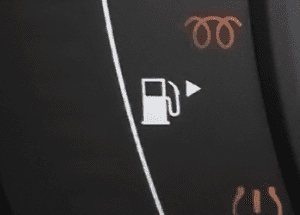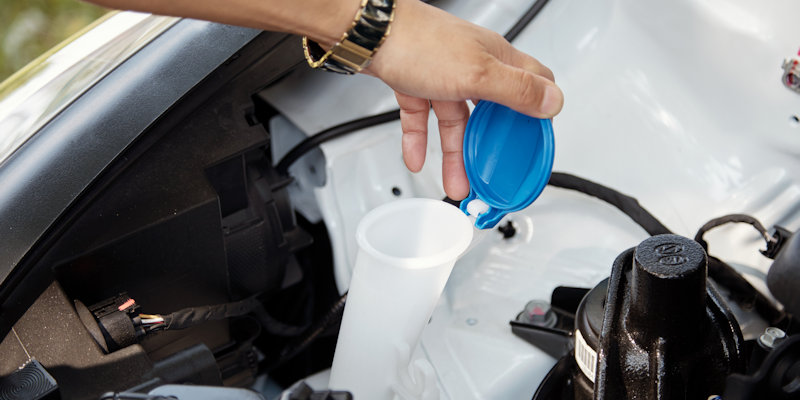Crawford’s Auto Repair offers vehicle fluids maintenance to owners of cars, trucks, vans and other vehicles in Chandler, Gilbert, and nearby areas.
Schedule An AppointmentMaintaining vehicle fluids at their proper levels and in proper condition is a great way to ensure that your vehicle operates efficiently and safely. Proper vehicle maintenance is the best way to avoid costly repairs down the road. Call 480-201-0740 to schedule an all-fluids check.
This page will describe the purpose of all vehicle fluids, when they should be checked and how often they should be flushed if ever. It is intended to be a good reference which supplements other information on this site, including the Oil Change & Works Package. The seven vehicle fluids which are most commonly discussed include engine oil, brake fluid, coolant, power steering fluid, windshield washer fluid, transmission fluid and battery fluid. Yet, your vehicle may have other fluids which require proper attention. These include gasoline (of course the vehicle can’t run without it), various gear lubricants and diesel exhaust fluid for diesel engines. These are also discussed to make this page more comprehensive than other pages which you might find online.
Fuel, Gasoline or “Gas” – Poor Gas Mileage Can Indicate Vehicle Problems
In a gas-powered vehicle, gasoline is ignited in the chambers of the engine to create the controlled explosions that power the vehicle, which is often referred to as “internal combustion”. The more efficiently your engine runs, the better gas mileage you’ll get. Most individuals driving in the suburbs of Chandler, Gilbert, and surrounding areas of the East Valley have to refill their vehicles with gas about every 1-2 weeks.

The arrow next to fuel symbol indicates which side of the vehicle the gas cap is on.
If you happen to be driving an unfamiliar vehicle or getting brain fog in your own vehicle and can’t remember which side the gas cap is on, simply look at your dashboard. There will be an arrow pointing to the side where it is located. You’ll find the arrow near the gas gauge or empty gas light.
How far can you drive while your gauge is on empty? It’s different for every make and model, but no more than 25 miles is a safe estimate. (It’s actually much farther for most makes and models but why push it?) If you happen to overestimate how far your vehicle can go and you get stuck on the road, then keep in mind that most car insurance companies offer road-side assistance. Free road side assistance may also be available as a perk from your credit card.
How do I know if I’m getting good gas mileage? Use this widget below to see what the gas mileage usually is for your make and model. You can also track your gas mileage with certain mobile apps for Apple and Android. If you discover that you’re not getting the gas mileage that you should be getting, then bring the vehicle to Crawford’s Auto to have it evaluated.
How do I know which grade of gasoline is best for my vehicle? First of all, if you drive a diesel engine then there should only be one option for you and do not fill your vehicle with regular gasoline. This can be dangerous and it will damage the engine. If you happen do it on accident then have the vehicle towed to the shop and we’ll help you remove it.
For most regular gasoline vehicles the cheapest option of the three gas grades is sufficient, and you’re wasting your money if you choose higher octane, unless the vehicle manufacturer indicates otherwise. Check your vehicle owner’s manual to be sure.
Vehicle Fluids Maintenance – Which Fluids Are Checked With Standard Maintenance Checks?
The fluids that are part of regular vehicle fluids maintenance include engine oil, brake fluid, coolant, power steering fluid, windshield washer fluid, transmission fluid, and battery fluid. These are checked with every maintenance service, oil change and works package, and landmark mileage maintenance checks (30,000, 90,000 and 150,000 miles). We also frequently check these fluids with other services. For more details on when they should be checked refer to the Basic Maintenance Schedule.
Engine Oil
The engine oil lubricates engine pistons and other moving parts. Oil changes are generally recommended every 5,000 miles and include a full works package at Crawford’s Auto. See the full details of the Oil Change & Works Package.
Brake Fluid
The level and condition of brake fluid is also observed during our free brake checks. The brake fluid is important for lubricating the hydraulic unit of the anti-lock brakes and the calipers. Often the brake fluid level is checked by illuminating the reservoir without opening the system, if the reservoir is transparent. Unless there is a suspected leak or other problem we don’t flush the fluid or test it further. Actually, a brake fluid flush is often a service that is oversold at other shops. See 3 “Standard” Maintenance Services That Are Complete Nonsense.
Learn more about Brake Services.
Coolant
The coolant helps to keep the engine from overheating while running. Coolant is installed in the radiator with distilled water in a 50/50 solution. It is checked with every maintenance visit or when cooling symptoms are present. Low fluid indicates a leak which should be investigated further.
Some of the coolant is distributed through the heater/AC unit. That’s why if you’re car starts to overheat while driving, it’s best to turn off the AC and even turn on the heat. It may seem counter-intuitive to turn on the heat when the engine is overheating (especially in hot Arizona weather). Yet, it redistributes the coolant from the AC system to the engine, which is why it helps buy a little time. It’s just a little time to pull over if you need it; if the engine is overheating pull over as soon as possible.
There is an engine temperature gauge on the dash of the vehicle which shows the temperature while the engine is running. If the engine begins to overheat, a temperature light on the dash will probably illuminate. If this happens then pull over safely and have the vehicle towed to the shop. Learn more about Dashboard Warning Lights.
Cooling System Flush – We actually prefer to call this a “cooling system service” since the purpose is to do more than simply flush the system and replace new coolant. This is performed about every 5 years or 100,000 miles.
Learn more about Cooling System Services.
Power Steering Fluid
The power steering fluid helps to lubricate the power steering unit. When it’s low, some makes and models will transmit a hum that sounds similar to a Delorean (the car in the Back to the Future movies). This sound does not indicate that you’re about to travel through time. It means your power steering needs to be serviced. Of course, if your vehicle is a Delorean and you’re worried about the power steering then you might have a dilemma since it sounds the same. No wonder Doc Brown was a little crazy.
Low power steering fluid is an indication of a leak that should be investigated. If your power steering doesn’t function you should still be able to steer your vehicle, it will just be a little harder.
A power steering flush is NOT a standard maintenance service. It’s only something that is done with repairs and it’s a service that is often oversold in other shops. See 3 “Standard” Maintenance Services That Are Complete Nonsense.
Windshield Washer Fluid
The windshield washer fluid can be used to help clean a dusty, dirty windshield while driving in non-rainy conditions. It is important to keep this refilled after use so that there is always fluid available to increase visibility while driving if needed. Checking the windshield washer fluid is part of every Safety Check, and it is topped off whenever it is low.
Transmission Fluid
The transmission fluid helps keep the transmission lubricated. The transmission is a box of gears which relay the energy produced in the combustion engine onto the drive train, which transmits into the wheels turning so that you drive forward as you apply the accelerator pedal.
Some vehicles have a dipstick to check the transmission fluid which is similar to dipsticks commonly seen for engine oil. Yet, other vehicles have very limited access to the transmission fluid. We check this fluid whenever it is practical.
Transmission Flush – We also prefer to call this a “transmission service” if it is needed at all. Many modern vehicles do not require a transmission service as preventative maintenance; if yours does then it’s probably at around 100,000 miles. Learn more about Transmission Services.
Battery Fluid
Low battery fluid can indicate the need to change the battery, which is primarily used to power the starter motor that starts the engine. Often the condition of the battery terminals will also indicate the need to change the battery. Learn more about the battery.
Less Common Fluid Maintenance
The 7 fluids listed above are the most commonly discussed fluids of the vehicle. However vehicles can have other fluids which will also require some level of maintenance depending on the make and model of the vehicle.
Diesel Emissions Fluid or Diesel Exhaust Fluid (DEF) (In Diesel Engine Vehicles)
Diesel engines built since 2010 will require re-installation of diesel emissions fluid, also known as diesel exhaust fluid (DEF). This fluid is sprayed into the exhaust system to neutralize NOx into harmless nitrogen and water. The fluid will need to be refilled about every 5,000 to 6,000 miles which lines up exactly with oil changes. Learn more about Diesel Auto Services.
Clutch Fluid
If you drive a manual transmission vehicle then it may have clutch fluid, which is essentially the same as the brake fluid and is also called hydraulic fluid. It is checked with every maintenance check if accessible and replaced if it is low or has debris. Low clutch fluid or shifting issues would indicate the need to investigate further. Otherwise the clutch fluid is replaced about every 30,000 miles or according to manufacturer’s recommendations. Learn more about Clutch & Transmission Services.
Differential Fluid
Vehicles with rear-wheel drive will have a differential which allows the rear wheels to turn at different rates when the vehicle is turning a corner. It’s a “gear box” part and as such it needs fluid to lubricate the gears, similar to the transmission fluid. Unless there are symptoms with the differential, the fluid is not changed for 30,000 to 60,000 miles depending on manufacturer’s specifications. If it has an accessible fluid plug then the differential fluid may be checked with each oil change. (4WD and AWD vehicles also have differentials that are similarly serviced)
Transfer Case Fluid
A transfer case is another “gear box” type part that is found in All Wheel Drive vehicles. Similar to the transmission, differential and even the clutch listed above, which all have fluids to lubricate the gears, a transfer case has transfer case fluid. Transfer case fluid may or may not be checked with every oil change depending on it’s accessibility (similar to the transmission). Yet, it will be checked if there are any symptoms while using 4-wheel drive. The fluid should also be changed every 15,000 to 60,000 miles depending on the manufacturer’s recommendation. Consult the owner’s manual. Learn more about 4WD & AWD.
Universal Joint Lubrication, CV Joint Grease, Chassis Lubrication
If the universal joints of the drivetrain are the type that allow re-lubrication then they should be re-lubricated with each oil change. CV Joint grease is only reapplied after a CV joint repair, and it’s not considered unless the boot is broken. Chassis lubrication covers a wide range of components, including all of the suspension bushings and joints, steering joints, sway bars, and U-joints. Learn more about Drivetrain Services.
Rack & Pinion Or Gearbox Lubrication
The rack & pinion or gearbox of a steering system are gear parts which need lubrication just like parts of the drivetrain. Changing the lubrication on these parts is not as common but can be performed according the manufacturer’s recommendation. Learn more about Steering & Suspension services.
Are There Any Fluids That Are Not Checked With Standard Maintenance?
Yes. Since gasoline has a constant turnover within the vehicle it’s not part of standard maintenance to check it. However the fuel system may need repairs.
AC Refrigerant (AC Freon)
We avoid opening the AC system unless there is a clear indication that it is needed. So we do not check AC refrigerant as standard maintenance. However, we would open the system for an AC recharge and/or AC repairs if the air conditioning is under performing. If your AC is not cooling your vehicle properly then learn more about the Free AC Check and AC Services.
What Effect Can Non-Native Fluids Have On My Vehicle? Can I Use Store-Bought Additives, Supplements and “Stop Leaks”?
Each vehicle system is meant to be maintained as a closed or mostly-closed environment with the fluids in proper condition and at proper levels. Leaks not only allow the existing fluid to get out but can also allow other contaminants to get in. Other contaminants can be other fluids such as moisture or oils, as well as debris and particles which ruin the system.
In almost all cases, we recommend against using store-bought additives and supplements in your vehicle. One example of an additive that you should not use is “AC stop leak”. People use this to stop a leak in their AC system, but the same chemical compound which clogs the leak also clogs the rest of the system. Another bogus service that is often sold by other shops is an air induction cleaning, which is essentially spraying foreign fluids into the engine through the air intake system. This is bad for the engine.
One exception to this rule may be a regular addition of fuel system cleaner like STP Injector Cleaner, or Techtron fuel system cleaner to keep your fuel system clean. If you’re ever in doubt about whether you can use a store-bought additive, then give us a call first and we’ll explain whether it might be a good idea or not.
Call 480-201-0740 To Schedule An Appointment for Vehicle Fluids Maintenance
If your vehicle is due for standard maintenance or if it is manifesting symptoms that can indicate low fluid levels, then bring it to the shop today for an affordable inspection. Call 480-201-0740 to schedule an appointment.



No Comments
Sorry, the comment form is closed at this time.